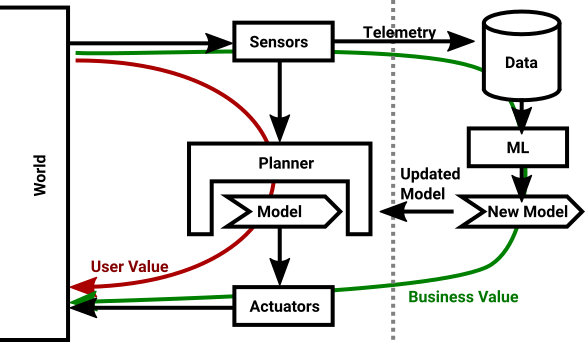IoT Value Chain
I'd like to propose a conceptual model for a new type of business we are seeing emerging.
In Modern Internet Businesses, value is tied to data, so why not analyze the flow of data inside a business?
Here is a conceptual model that fits Nest, Google, Facebook and many IoT businesses.

- Firstly there is the world: this a real physical thing with behavior that is worth understanding, for example a household heating system or a teenager with a smartphone.
- A number of sensors connect the system to the world. These might be a thermometer, a search box or your driving history.
- Based on the sensors, a controller plans a suitable response, using a model of the world as a reference. The model answers questions like "If I turn off the heating, will the user get cold?" or "Will they click this advert?"
- Finally, actuators cause some effect on the world. This might be a heating valve, a search engine results page or an insurance quote.
This loop is what what provides value to users, by keeping the house warm or finding the quickest route through central London.
However value to the business comes through a different path:
- All of the user's sensors also send telemetry to a backend database. The quantity of data in this database depends on market share and time, and thus it forms a defensive moat against new competition.
- This data is then processed using some kind of Machine Learning into a New Model. The 'machine learning' could be anything from simple statistical inference to modern fancy deep learning techniques.
- The new model is deployed and provides better results to users.
I claim that it is this second loop that provides value to the business.
How is this useful?
A good software architecture would support those information flows and provide for close to optimal telemetry capture, model synthesis and planner development. The low latency 'user value' path in green will have different requirements to the slower 'business value' path in red that generates business value.
Secondly, we've identified the Model as a valuable asset. Therefore is is reasonable to ask:
- "How will this proposed project improve the quality of our model?"
- "How do to the predictions of our model compare to competitors' on the dimensions customers care about?"
Not all business work like this, but for those that do I hope this is a useful conceptual framework.